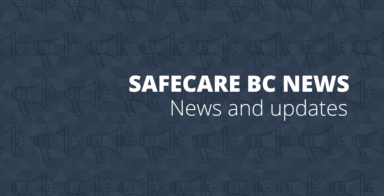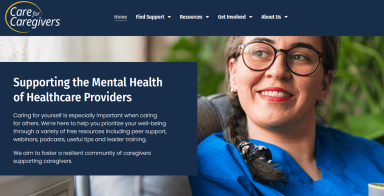Continuing care staff are passionate and hard-working, yet their work can be challenging and stressful. They also have some of the highest injury rates of all workers in BC. That’s why continuing care staff need to take care of themselves so they can take care of others.
What can you do?
Check out our mental health resources and videos, highlighting why caregivers must consider their mental health and care for themselves. Share these resources at team meetings or before training sessions.
What can leaders do?
- Higher stress levels are associated with increased healthcare and disability costs, absenteeism, turnover, and reduced productivity.
- Workplaces with positive work environments have better organizational performance regarding health and safety and outcomes for residents and clients.
- Healthy organizational cultures nurture employee well-being, engagement and performance.
In today's fast-paced and demanding world, it's easy to overlook the importance of self-esteem, both for individuals and within the workplace. Self-esteem, essentially how we value and perceive ourselves, plays a crucial role in our overall well-being, ability to cope with challenges, and success in our personal and professional lives. High self-esteem is linked to greater happiness, resilience, and stronger relationships for individuals. It empowers us to pursue our goals, overcome setbacks, and believe in our capabilities.
In the workplace, self-esteem is a powerful driver of employee engagement, productivity, and innovation. When employees feel confident and valued, they are more likely to take initiative, contribute creatively, and perform at their best. A workplace that fosters self-esteem creates a positive and supportive environment where individuals can thrive and reach their full potential.
However, low self-esteem can have detrimental effects. It can lead to self-doubt, anxiety, and depression, hindering personal growth and professional success. In the workplace, it can manifest as low motivation, decreased productivity, and difficulty in forming positive relationships with colleagues.
Therefore, it's crucial to understand the importance of self-esteem and take proactive steps to cultivate it, both in ourselves and in those around us. By fostering a culture of appreciation, providing growth opportunities, and promoting a positive and inclusive environment, we can empower individuals to develop a strong sense of self-worth and unlock their true potential.
Tips for fostering your self-esteem
- Challenge negative thoughts.
- Identify and reframe: Start noticing those negative thoughts ("I'm not good enough," "I always mess up"). Challenge them with positive affirmations or evidence to the contrary.
- Practice self-compassion: Treat yourself with the kindness you'd offer a friend. Everyone makes mistakes!
- Focus on strengths.
- Acknowledge your accomplishments: Big or small, celebrate your wins! Keep a journal to track your successes.
- Identify your talents: What are you good at? What do you enjoy? Lean into those strengths.
- Set realistic goals.
- Start small: Break down larger goals into smaller, achievable steps to build confidence with each success.
- Celebrate progress: Acknowledge your efforts and progress, not just the result.
- Take care of yourself.
- Prioritize physical health: Exercise, healthy eating, and enough sleep significantly impact how you feel about yourself.
- Engage in activities you enjoy: Make time for hobbies, relaxation, and things that bring you joy.
- Build positive relationships.
- Surround yourself with supportive people: Spend time with those who lift you and make you feel good.
- Set boundaries: Learn to say "no" to things that drain your energy or don't align with your values.
- Practice gratitude.
- Focus on the good: Take time each day to appreciate the positive things in your life, no matter how small.
- Keep a gratitude journal: Write down things you're thankful for.
- Give back to others.
- Volunteer or help someone in need: Helping others can boost your sense of purpose and self-worth.
- Seek support when needed.
- Talk to a trusted friend or family member: Sharing your struggles can be incredibly helpful.
- Consider professional help: A therapist can provide guidance and support in addressing deeper self-esteem issues.
What can employers do?
- Foster a culture of recognition and appreciation.
- Regularly acknowledge employees' contributions: Go beyond annual reviews. Offer frequent praise, both publicly and privately, for achievements big and small.
- Implement employee recognition programs: This could include "employee of the month" awards, peer-to-peer recognition initiatives, or small tokens of appreciation.
- Celebrate team successes: Acknowledge collective efforts and milestones to foster a sense of belonging and shared accomplishment.
- Provide opportunities for growth and development.
- Offer training and development programs: Invest in employees' professional growth through workshops, mentorship programs, or tuition assistance.
- Encourage skill development: Support employees in learning new skills or expanding their existing ones.
- Provide opportunities for advancement: Create clear career paths and promote from within whenever possible.
- Encourage autonomy and ownership.
- Delegate meaningful tasks: Give employees a sense of ownership and responsibility.
- Empower decision-making: Encourage employees to contribute ideas and participate in decision-making processes.
- Trust employees to do their jobs: Avoid micromanaging and create a culture of trust and respect.
- Promote work-life balance.
- Offer flexible work arrangements: Consider remote work, flexible hours, or compressed work weeks.
- Encourage employees to take breaks: Promote a healthy work-life balance to prevent burnout and stress.
- Provide generous time-off benefits: Ensure employees have adequate vacation and sick leave.
- Create a positive and inclusive work environment.
- Foster open communication: Encourage feedback, active listening, and respectful dialogue.
- Promote diversity and inclusion: Create a workplace where everyone feels valued and respected, regardless of background.
- Address workplace conflict promptly and fairly: Ensure a safe and supportive environment free from harassment and discrimination.
- Provide support for mental health.
- Offer employee assistance programs (EAPs): Provide access to confidential counselling and mental health resources.
- Promote mental health awareness: Educate employees about mental health and reduce stigma.
- Encourage self-care practices: Promote healthy habits and provide resources for stress management.
By embracing these strategies, employers have the power to cultivate a thriving workplace environment where employees not only feel valued and supported but also empowered to reach their full potential. This proactive approach not only enhances self-esteem and engagement but also fosters a culture of well-being that ultimately drives organizational success. Investing in your workforce is not just a business decision—it's a commitment to nurturing a vibrant community where everyone can flourish together.
















